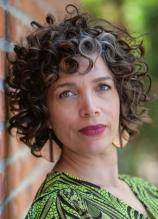Jamie Figueroa
Biography
Jamie Figueroa
Jamie Figueroa is the author of the critically acclaimed novel BROTHER, SISTER, MOTHER, EXPLORER, which was shortlisted for the Reading the West Book Award and longlisted for the Center for Fiction First Novel Prize, was an Indie Next pick, a "Good Morning America" must-read book of the month, and was named a most anticipated debut of the year by Bustle, Electric Literature, The Millions and Rumpus.
A member of the faculty in the MFA Creative Writing program at the Institute of American Indian Arts, Figueroa has published writing in American Short Fiction, Emergence Magazine, Elle, McSweeney’s, Agni, The New York Times and the Boston Review, among other publications. A Voices of Our Nations Arts Foundation (VONA) alum, she received a Truman Capote Award and was a Bread Loaf Rona Jaffe Scholar. Boricua (Afro-Taíno) by way of Ohio, Figueroa is a longtime resident of northern New Mexico.
Jamie Figueroa





